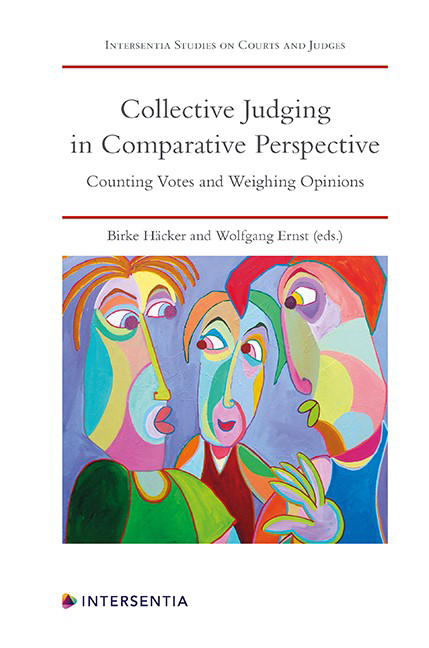Book contents
- Frontmatter
- Preface
- Contents
- List of Cases
- List of Contributors
- PART I DESIGNING COLLEGIATE COURTS’DECISION-MAKING PROCESSES
- PART II COLLEGIATE COURTS IN THE COMMON LAW TRADITION
- PART III COLLEGIATE COURTS IN THE EUROPEAN CIVIL LAW TRADITION
- PART IV COLLEGIATE COURTS IN A NON-EUROPEAN CIVIL LAW JURISDICTION: THE CASE OF JAPAN
- PART V SUPRANATIONAL AND INTERNATIONAL COLLEGIATE COURTS
- PART VI VOICES FROM THE AUDIENCE AND CLOSING REMARKS
- About the Editors
Chapter 13 - Collective Judging in the Court of Justice of the European Union
Published online by Cambridge University Press: 09 February 2021
- Frontmatter
- Preface
- Contents
- List of Cases
- List of Contributors
- PART I DESIGNING COLLEGIATE COURTS’DECISION-MAKING PROCESSES
- PART II COLLEGIATE COURTS IN THE COMMON LAW TRADITION
- PART III COLLEGIATE COURTS IN THE EUROPEAN CIVIL LAW TRADITION
- PART IV COLLEGIATE COURTS IN A NON-EUROPEAN CIVIL LAW JURISDICTION: THE CASE OF JAPAN
- PART V SUPRANATIONAL AND INTERNATIONAL COLLEGIATE COURTS
- PART VI VOICES FROM THE AUDIENCE AND CLOSING REMARKS
- About the Editors
Summary
As in all legal systems, collective decision-making in the Court of Justice of the European Union (CJEU) has to meet the principal requirements of the rule of law to structure the judicial process in a way that ensures fair and rational decisionmaking and leads to decisions which do not merely produce a legal finding, but provide a ratio decidendi allowing for acceptance by the legal community and the public in general. As I shall underline, these requirements might be of particular importance in the legal order of the European Union (EU), due to its supranational nature. But let me approach the subject step by step.
THE NATURE OF THE LEGAL ORDER OF THE EUROPEAN UNION
Judicial decision-making in the European Union is indeed profoundly linked to its supranational character and its specific mission to create common rules – which, by their very purpose, are to be given a uniform meaning across the Union – in a wide variety of areas. Needless to say that such a legal order entails rather specific requirements in terms of equivalence, effectiveness and non-discrimination and favours legal evolutions which are easy to incorporate into the national law of the Member States or at least a significant number of them.
The reason for the very existence of the European Union and its legal order is, first and foremost, the historic choice to abandon centuries of power play between nations, characterised by domination and political pressure, in which at best a balance of powers could be attained. But that kind of order in international relations mostly ended up, in essence, in a permanent threat to peace, prosperity and well-being of European citizens. In stark contrast to this historic tradition, the European Integration brought about the rule of law between its Member States – appreciated particularly by smaller Member States – and a legal protection of Union citizens against acts both of the institutions of the Union and of Member States when implementing European Union law. The rule of law in the European Union has given the Court of Justice, in addition to its function as supreme authority in interpreting Union law, a set of powers fully comparable to a constitutional court, allowing notably for judicial review and annulment of secondary legislation found to be in breach of primary law of the Union and, in particular, of fundamental rights.
- Type
- Chapter
- Information
- Collective Judging in Comparative PerspectiveCounting Votes and Weighing Opinions, pp. 253 - 266Publisher: IntersentiaPrint publication year: 2020



